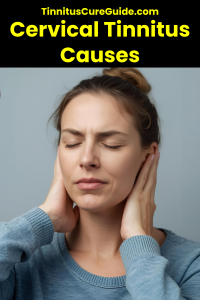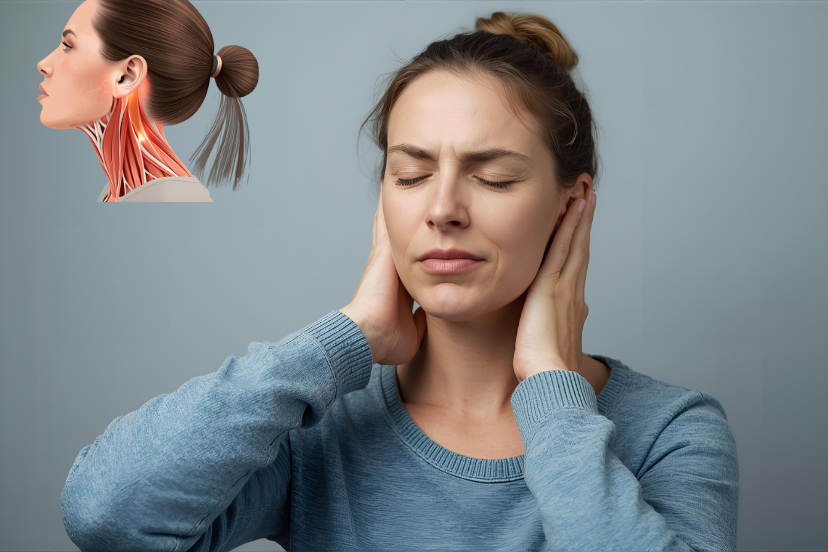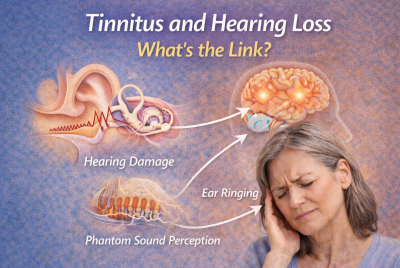Cervical Tinnitus Causes: Understanding the Link Between Neck Problems and Ear Ringing
If you’ve ever experienced ringing, buzzing, or whooshing in your ears without an external sound, you know how frustrating tinnitus can be. For many, the condition is linked to loud noise exposure or age-related hearing loss. But a lesser-known form, called cervical tinnitus, is connected to problems in the neck. Neck tension, poor posture, or cervical spine disorders can trigger or worsen tinnitus symptoms. This connection is often overlooked, leaving sufferers searching for answers. In this guide, we’ll explore the most common cervical tinnitus causes, how to recognize the symptoms, and what treatment and prevention options are available.
❓ What Is Cervical Tinnitus?
Cervical tinnitus refers to ear ringing that originates from neck-related issues, rather than from the inner ear alone. Unlike standard tinnitus, which is primarily auditory, cervical tinnitus often results from:
-
Muscle tension in the neck and shoulders
-
Cervical spine disorders, such as arthritis or disc degeneration
-
Poor posture from long hours at a desk or computer
-
Whiplash injuries or trauma to the cervical spine
The ear ringing may feel like high-pitched ear noise, a constant buzz, or a pulsating sound that worsens with neck movement or stiffness.
💡 Main Cervical Tinnitus Causes
Understanding the triggers of cervical tinnitus is the first step toward managing symptoms. Below are the most common causes:
1. Poor Posture and Muscle Tension
Slouching at a desk or looking down at a phone strains neck muscles, leading to tightness and nerve compression. Over time, this poor posture can disrupt blood flow and nerve signals to the inner ear, causing ear buzzing sounds.
2. Cervical Spine Disorders
Conditions like degenerative disc disease, herniated discs, and arthritis affect the alignment of the cervical spine. These changes can irritate nearby nerves and blood vessels, contributing to constant ear ringing.
3. Whiplash and Neck Injuries
Traumatic events such as car accidents or sports injuries often lead to whiplash. The resulting inflammation and muscle tension may create or worsen sudden tinnitus symptoms.
4. Nerve Compression
Compressed nerves in the cervical spine, especially the upper cervical nerves, can alter how the brain processes sound. This neurological disruption is a key factor in many cervical tinnitus causes.
5. Reduced Blood Flow
Tight muscles or cervical misalignment can restrict blood flow to the inner ear and auditory pathways. Poor circulation increases the risk of pulsatile tinnitus, a rhythmic sound in sync with your heartbeat.
🔊 Symptoms of Cervical Tinnitus
Cervical tinnitus often comes with unique signs that distinguish it from other tinnitus types:
-
Ringing or buzzing in the ears triggered by neck movement
-
Ear ringing at night that worsens after long periods of poor posture
-
Neck stiffness, pain, or tightness alongside ear noise
-
Headaches or dizziness linked to cervical muscle tension
-
Fluctuating tinnitus intensity depending on posture or stress
If these symptoms sound familiar, your tinnitus may be related to cervical issues rather than ear-only causes.
🧠 How Stress Plays a Role
There’s a strong stress and tinnitus connection, especially with cervical cases. Stress causes muscle tension in the neck and shoulders, which can aggravate tinnitus symptoms. Over time, chronic stress leads to chronic tinnitus, creating a frustrating cycle.
Relaxation methods such as deep breathing, yoga, and mindfulness can help reduce both stress and tinnitus flare-ups.
🏥 Treatment Options for Cervical Tinnitus
Managing cervical tinnitus often requires a multi-step approach that targets both the neck and the auditory system.
⚕️ Medical Treatments
-
Physical Therapy: Improves posture, strengthens neck muscles, and reduces nerve compression.
-
Chiropractic Care: Helps realign the cervical spine to restore normal nerve function.
-
Medications: Anti-inflammatories and muscle relaxants may reduce pain and tension.
-
Injections: Corticosteroid injections may be used for severe inflammation.
💊 Natural Remedies for Cervical Tinnitus
-
Heat therapy: Warm compresses to relax neck muscles.
-
Massage therapy: Improves circulation and relieves muscle stiffness.
-
Gentle stretching: Neck rolls, chin tucks, and shoulder shrugs can reduce strain.
-
Hydration and diet: Magnesium, omega-3s, and vitamin B12 support nerve health.
🧘♀️ Sound Therapy and Devices
-
Tinnitus sound therapy apps: White noise or nature sounds mask ear ringing.
-
Sound masking devices: Worn in the ear, similar to hearing aids.
-
Hearing aids for tinnitus: Helpful if hearing loss accompanies cervical tinnitus.
🚨 Prevention Tips for Cervical Tinnitus
Preventing neck-related tinnitus requires daily attention to posture and lifestyle.
-
Correct Your Posture – Keep your ears aligned with your shoulders when sitting or standing.
-
Take Frequent Breaks – Every 30 minutes, stretch and move around.
-
Invest in Ergonomics – Use supportive chairs, ergonomic keyboards, and monitor risers.
-
Strengthen Neck Muscles – Regular strength training reduces strain.
-
Practice Relaxation – Yoga and mindfulness reduce stress-related muscle tightness.
-
Avoid Prolonged Phone Use – Don’t cradle the phone between your ear and shoulder.
With consistent effort, these small changes can reduce both neck stiffness and tinnitus flare-ups.
🧑 Real-Life Coping Strategies
Living with cervical tinnitus can feel overwhelming, but practical coping strategies make a big difference:
-
Use a white noise machine at night to improve sleep.
-
Keep a symptom journal to track posture, diet, and tinnitus triggers.
-
Try gentle yoga or tai chi for flexibility and stress relief.
-
Join a tinnitus support group (many available online in the U.S.).
-
Speak with your doctor about the best supplements for tinnitus, such as magnesium or ginkgo biloba, though results vary.
❓ FAQs About Cervical Tinnitus Causes
1. What are the most common cervical tinnitus causes?
The main causes include poor posture, cervical spine disorders, whiplash injuries, nerve compression, and reduced blood flow. These neck-related issues can alter auditory signals and trigger ringing in the ears.
2. Can neck posture really cause tinnitus?
Yes. Poor posture creates neck tension and spinal misalignment, which can compress nerves and restrict circulation. This disruption often results in ear buzzing sounds that worsen with prolonged sitting or slouching.
3. How can I tell if my tinnitus is cervical-related?
If your tinnitus changes with neck movement, comes with stiffness, or worsens after desk work, it may be cervical tinnitus. A healthcare provider can confirm by evaluating your neck and cervical spine.
4. Does cervical tinnitus go away on its own?
In some cases, yes—especially if caused by temporary muscle tension. However, chronic cervical spine conditions often require physical therapy, posture correction, or medical treatment to reduce long-term symptoms.
5. What treatments are effective for cervical tinnitus?
Treatments include physical therapy, chiropractic adjustments, massage, sound therapy, and lifestyle changes. In severe cases, medication or injections may be recommended by a doctor.
6. Can stress make cervical tinnitus worse?
Absolutely. Stress tightens neck and shoulder muscles, increasing strain on cervical nerves and worsening tinnitus. Practicing relaxation techniques helps reduce both stress and tinnitus symptoms.
7. Are there natural remedies for cervical tinnitus?
Yes. Natural approaches include heat therapy, stretching, massage, hydration, and diet changes. These remedies support neck health, improve blood flow, and often help reduce ear ringing at night.
💥 Cervical Tinnitus Causes – Conclusion
Cervical tinnitus is a complex but manageable condition. By understanding the main cervical tinnitus causes—from poor posture to cervical spine disorders—you can take targeted steps to find relief. With proper posture, stress management, and treatment options like sound therapy or physical therapy, many people significantly reduce symptoms and improve their quality of life.
If your tinnitus is linked to neck tightness or posture, small daily changes may bring big improvements. Always consult a healthcare provider to create the best plan for your needs.
⚠️ Disclaimer
This article is for informational purposes only and should not be taken as medical advice. Tinnitus has many possible causes, and cervical issues are just one factor. Always consult a qualified healthcare professional or audiologist for diagnosis and treatment.







